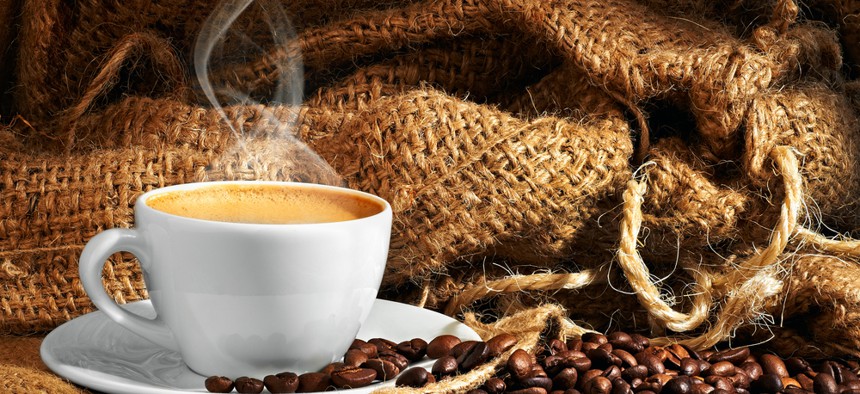
Image via Aleksey Troshin/Shutterstock.com
11 Things You Didn't Know About Drinking Coffee at Work
Your comprehensive, fully caffeinated guide.
The cardinals who gathered at the Vatican last month took a very important daily pause during their deliberations to choose a new pope.
“There’s a coffee break for about 30 minutes at a special buffet area in the front part of the audience hall,” the Rev. Thomas Rosica told CNN. “Cardinals have an opportunity to go down and mix and mingle.”
Whether you’re a prince of the church or a cubicle-dwelling drone, there seems to be an unbreakable bond between work and coffee: The boss provides the java and the java fuels the workers, keeping them revved up, connected, and toiling away at their given tasks.
Here’s everything you ever wanted to know about coffee at work, but were too over- or under-caffeinated to ask:
Surprise! Coffee keeps you alert
Caffeine, the most commonly consumed psychoactive drug in the world, is a stimulant. It blocks the adenosine receptors in the brain, which lets the neurotransmitters like epinephrine and dopamine that are associated with alertness run wild. There are many studies showing that ingesting caffeine helps workers perform better, especially if they’re working when their circadian clocks say they should be sleeping. Researchers studying night-shift workers found coffee is effective in counteracting any ”sleepy effect,” and caffeinated shift workers made fewer errors than their decaffeinated colleagues.
Coffee eases the pain of working at a desk
There’s a reason why computer programmers are so wired: Consuming caffeine has been found to ease pain in the neck, shoulders, forearms, and wrists that are often experienced by those of us who are chained to our keyboards.
Coffee is a social lubricant
Researchers from MIT found that employees who take coffee breaks together are more productive. The study tracked a group of workers in a call center and found that when coffee breaks where scheduled so that co-workers could take them at the same time, their performance improved.
Even without the coffee, coffee shops are good places to work
A study in the Journal of Consumer Research explored the effects noise has on creativity. They found that a low to moderate level of ambient sound, like the one found in your favorite coffee shop working spot, improves creativity. A tech startup in Virginia developed Coffitivity, a coffee shop noise simulator.
The best time for a coffee is around 2 p.m.
The UK’s National Health Service thinks energy levels are at their lowest at about 2:16 pm. The amount of time it takes for coffee to kick in depends on a number of factors–including age, weight, gender, and caffeine tolerance level–but 15 to 30 minutes is a pretty good window. Pro tip: Supercharge your rejuvenation with acaffeine nap. A cup of coffee followed by a 15-minute snoooze. By the time you wake up, the drug should be kicking in.
Coffee can make a stressful situation more stressful
Caffeine can “exaggerate sympathetic adrenal-medullary responses to the stressful events of normal daily life.” Translation: It makes your blood pressure rise and spikes levels of adrenaline, both of which are associated with higher levels of self-reported stress. The effect doesn’t diminish when you leave the office.
The coffee break is a 20th century invention
Several towns and companies claim to be the first to offer workers a pause during the workday to refuel on coffee, including Barcolo, a Buffalo, New York-based furniture manufacturer that later became known as Barcalounger (it madeemployees pay for their own coffee, however). After World War II, many unions made a coffee break part of their contracts.
It’s also an invention of Madison Ave, with an assist from a behavioral psychologist
The term “coffee break” was unknown before 1952, when the Pan-American Coffee Bureau ran the ad campaign “Give yourself a Coffee-Break — and Get What Coffee Gives to You.” It was later popularized by John Watson, a psychologist who was working for Maxwell House. (Fun fact: Watson once conditioned an infant to bedeathly afraid of rats—and neglected to uncondition him when the experiment ended.)
Coffee may be a life saver, especially for older workers.
The US National Institutes of Health found a link between coffee-drinking and lower risks of death. People in their 50s and 60s who drink three or more cups of coffee a day have a 10% lower risk of death compared to those who don’t don’t drink coffee at all.
It even works with decaf
The same NIH study found that removing caffeine didn’t change coffee’s life-extending aura.
Baristas drink the most coffee
Duh. They are followed by food preparation/service workers, scientists, sales representatives, marketing/PR professionals, nurses, and editors/writers/media workers. Anecdotal evidence gathered by the Quartz staff suggests that last category of professionals deserves to be way higher on the list.
Read more about management at Quartz
Image via Aleksey Troshin/Shutterstock.com
NEXT STORY: Federal Leadership is on the Decline






